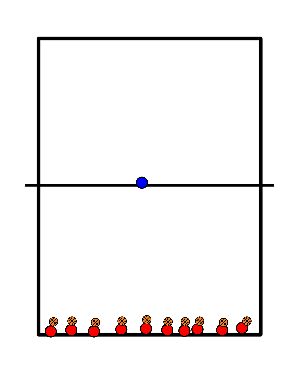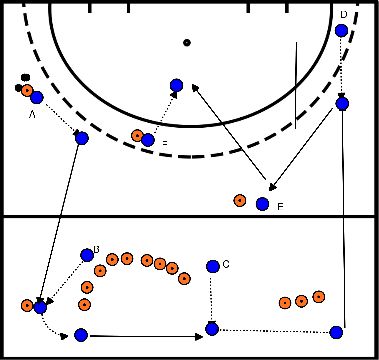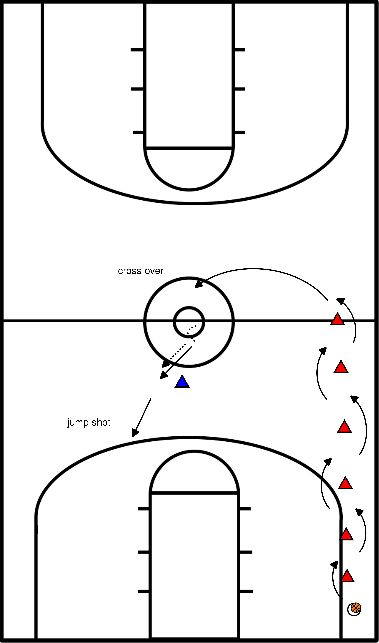Basketball drills for technique dribbling
Requirements:
Players must be able to dribble away from the ball diagonally with one hand at the side
Preparatory exercise:
Dribble the ball from the left hand to the right hand with a flat bounce while standing behind the back
Goal
: practice changing speed and direction with the ball behind the body, while keeping the dribbler's field of vision on the part of the field in front of him
Organisation:
- players dribble zigzagging between two lines along the length of the field
- when reaching a longitudinal line, make a mini jump stop and behind the back dribble
- change of direction and acceleration
- when the first dribbler is at the extended free throw line, the next one starts
Teaching points:
- look over the ball and survey the court in front of you
- after the mini jump stop, feet side by side at shoulder width
- Hand over the ball
- Pass the ball with a flat bounce behind your back to the other hand
- Change direction with a crossover step
Variations:
- start left and right
Requirements:
players must be able to dribble with two balls at once
Objective:
To allow players to maintain control of the ball against physical resistance
Organization:
- defender keeps his hands on the shoulders of the dribbler
- he moves backwards along with the dribbler, but gives some resistance
- across the width of the field, change at the sideline
- equal or uneven dribbling
- possibly a ladies ball in one hand and a men's ball in the other.
Teaching points:
- Dribble with power from the wrist.
Prerequisites:
Players should have a reasonable grasp of the basic technique of dribbling.
Objective:
to practice changing speed without changing direction
Organisation:
- players dribble to a line
- then make at least 2 dribbles on the spot
- and accelerate
- when the dribblers are at the free throw line, the next group starts
- at the free throw line, make at least 2 dribbles on the spot
- when the first group is past the free throw line, the next group starts
- at the end of the court turn around and on the way back 3 hesitations again
- players have to make sure that they don't bump into each other.
Teaching points:
- look over the ball and survey the field in front of you
- Keep the ball low during hesitations
- Hand behind the ball when accelerating
Variations:
- left and right hand
- Dribble with 2 balls
- Use dribbling goggles
Prerequisites:
master players crossover and behind the back
Objective:
to increase the speed of changing hands
Organization:
- Place 5 pawns in a straight line from three-point line crossing extended free throw line towards crossing sideline and center line. The pawns are placed less than 1 metre apart.
- players zigzag with a low crossover between the cones
- finish with lay up
- jump shot
- push off jump shot
- push off lay up
Teaching points:
- look over the ball and survey the field in front of you
- Leg on the side of the ball is in front
- Hand over the ball
- Crossover dribble is backwards in front of the body and low
- with an open step in the other direction
- always make a dribble in between
- The ball is low
- Bounce is flat and hard
Variations:
- start left and right
- Behind the back in position
- Pawns on the defensive half and a defender on the offensive half, directly over the halfway line. Pass the defender with one of the practised moves
Prerequisites:
Players must master the basic technique of dribbling.
Objective:
to improve the different dribbling techniques
Organisation:
- Players dribble back and forth across the field twice and then get a new assignment.
- and then get a new assignment
Tips:
- build up the level of difficulty: during the training, but also during the season
- If necessary, differentiate within the group; for example beginners do once a between the legs and advanced 4x
Techniques and teaching points:
- between the legs (leg on the side of the ball is back hand over the ball dribble is backwards diagonally between the legs and change direction low with a crossover step)
- Under the buttocks (after the mini jump stop the feet are next to each other at shoulder width hand over the ball fetch the ball with a flat bounce behind the back to the other hand with an open step changing direction)
- Behind the back (leg on the side of the ball is in front hand over the ball pass the ball with a quick movement behind the back hand with the ball so far through the hand that the wrist touches the hip on the other side. The ball will then hit the ground well in front of the body)
- Fake cross over (leg on the ball side is on the ground hand on the outside over the ball shoulders and front foot move short and fast to the free hand hand turns with a quick movement over the ball to the inside dribble the ball diagonally to the outside continued with an open step)
General
- look over the ball and survey the field in front of you
- The bounce is hard
- The ball is low
- Dribble with your wrist
- A change of hand is ALWAYS accompanied by a change of direction and speed
- Even after a feint, always change direction and accelerate
Variations:
- increase the number of times you make a movement: e.g. back and forth 3x between the legs dribble
- OR always 2 between the dribbles and then a between the legs dribble
- combine techniques, e.g. an between the legs dribble directly followed by a under the buttocks dribble
- start with different dribble starts: cross over step, open step, jab step
- Let these be preceded by a fake shot, fake pass etc.
- always stop at the sideline with a jump stop, lire or reli, followed by a half turn. The players then make
- then 4 stops and 4 dribble starts
Two balls:
- each player has two balls (also possible with a miniball for the strong hand and a men's ball for the weak hand)
- go back and forth 2 times, keep dribbling at the turning points
- always start from standstill with 5 hard, simultaneous dribbles
- vary equal/different hip, knee and ankle height
Prerequisites:
players must have a reasonable grasp of the basic technique of dribbling
Objective:
practice speed change and direction change with the ball in front
Organization:
- players dribble zigzagging between two lines along the length of the field
- when they reach a longitudinal line, they make a crossover dribble
- change direction and accelerate
- when the first dribbler reaches the extended free throw line, the next one starts
Teaching points:
- look over the ball and survey the court in front of you
- Leg on the side of the ball is in front
- hand over the ball
- crossover dribble is backwards in front of the body and low
- with an open step in the other direction
Variations:
dribble goggles use
Prerequisites:
- Players should have a reasonable grasp of the basic technique of dribbling.
Objective:
practice speed change and change of direction with the ball between the legs
Organization:
- players dribble zigzagging between two lines along the length of the field
- when they reach a longitudinal line with their foot, they make a dribble between the legs, changing direction and accelerating
- when the first dribbler is at the extended free throw line, the next one starts
Teaching points:
- look over the ball and survey the court in front of you
- stop with a jump in 2 TR
- Leg on the side of the ball is behind
- Hand over the ball
- dribble backwards between the legs and low
- with a crossover step in the other direction
Variations:
use dribbling goggles
Requirements:
- Players must be able to dribble away diagonally with one hand on the side of the ball
Preparatory exercise:
- two players stand next to the free throw line, both feet pointing to the back line.Pass to each other with a bounce pass behind the back
Objective:
To practice speed change and direction change with the ball behind the body, while keeping the dribbler's field of vision focused on the part of the field in front of him
Organisation:
- players dribble zigzagging between two lines along the length of the field
- when their foot reaches a longitudinal line, they make a behind-the-back dribble
- change direction and accelerate
- when the first dribbler is at the extended free throw line, the next one starts
- Teaching points:
- look over the ball and survey the court in front of you
- Leg on the side of the ball is in front
- hand over the ball
- Pass the ball with a quick movement behind your back
- Pull the hand with the ball through so far that the wrist touches the hip on the other side The ball then hits the ground well in front of the body, matching the speed at which the dribbler is moving, so that it bounces exactly into the other hand.
- direction change is often less than 90 degrees
Variations:Â-
- Start left and right
Prerequisites:
- players must already have good dribbling skills
Objective:
Using penetration to play the defender out of position and create a jump shot and use backup dribble to create space if that fails
Organisation:
- the four positions are always one metre outside the three-point line.
- always penetrate with the right hand on the right side of the helpline, on the left with the left hand.
- player 1 dribbles in hard with his right hand
- Switches hands under the buttocks at the bucket's edge
- and goes with a backup dribble with the left hand to the next position
- passes under the buttocks and with right again dribbles in hard
- to the third position with backup left and directly dives in with left again
- from the last position stop at the bucket's edge and take a jump shot
Teaching points:
- Always go in hard
- Keep body between ring and ball during backup
- Head right to overlook the whole width of the field.
- do not penetrate further than the bucket rim.
- dribble backwards to one meter outside the three-point line.
Variations:
- start on the other side
- Finish with rocker step, fade away etc.
- retreat instead of backup, i.e. jump backwards with two feet when breaking the penetration, then pass under the buttocks
- between the legs instead of under the buttocks
- The teacher selects 2 taggers.
- They have to stay within their box (within the 4 pilons) and tap the basketballs away from the runners if they want to cross.
- So the runners have to dribble to the other side without losing their basketball.
- If a runner doesn't have the basketball with him, he is finished and automatically becomes a tagger.
- A tip you can give to the runners is that they shield the ball with their body.
- This means keeping your body between the ball and the opponent.
- The runners are not allowed to cross again until everyone has tapped or reached the other side.
- In the end, as the game progresses, you get more and more taps and fewer runners.
- The last remaining runner is the winner.

- A runs in and (runs or around his/her axis and passes the ball to B or gives a sliding flat to B).
- B takes the ball open and gives a weighted push (a push that stops rolling) in the course of player C
- C takes the ball and accelerates to the pilons line without stopping or slowing it down (hip just in front of the left foot is the easiest way to do this) C the ball in the course of Player D
- Player D runs through the ball and takes the ball strongly. He runs through one gives a backhand pass (FINGERS SPREAD) to E
- Player E takes the ball at once and gives a bouncing ball in the course of F that takes and scores!
- Differentiation:
- Player A must give a slide on B (let the ball slide off your stick)
- Persist: you are chasing your ball

- Starting at the rear line
- Here you dribble between the cones
- Keep the ball low
- Speed is not so important
- Do control the ball
- At the center line make a cros over to the wing
- Then make a jump shot









